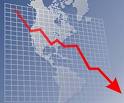“Future Economic Historians” Will Probably Call the Period That Began In 2007 “The Longest Depression”

Sure, last year was the first pre-election year stock market loss since the Great Depression. And admittedly, this week was the worst opening week of any year … EVER.
But that’s not the big news.
The big news is that a prominent economist – University of California economics prof Brad DeLong – wrote today:
Economist Joe Stiglitz warned back in 2010 that the world risked sliding into a “Great Malaise.” This week, he followed up on that grim prediction, saying, “We didn’t do what was needed, and we have ended up precisely where I feared we would.”
***
Joe Stiglitz is right.
***
In the aftermath of 2008, Stiglitz was indeed one of those warning that I and economists like me were wrong. Without extraordinary, sustained and aggressive policies to rebalance the economy, he said, we would never get back to what before 2008 we had thought was normal.
I was wrong. He was right.
***
Future economic historians may not call the period that began in 2007 the “Greatest Depression.” But as of now, it is highly and increasingly probable that they will call it the “Longest Depression.”
What’s he talking about?
We noted in 2009 that more Americans will be unemployed than during the Great Depression.
We noted in 2010:
The following experts have – at some point during the last 2 years – said that the economic crisis could be worse than the Great Depression:
- Fed Chairman Ben Bernanke
- Former Fed Chairman Alan Greenspan (and see this and this)
- Former Fed Chairman Paul Volcker
- Economics scholar and former Federal Reserve Governor Frederic Mishkin
- The head of the Bank of England Mervyn King
- Nobel prize winning economist Joseph Stiglitz
- Nobel prize winning economist Paul Krugman
- Former Goldman Sachs chairman John Whitehead
- Economics professors Barry Eichengreen and and Kevin H. O’Rourke (updated here)
- Investment advisor, risk expert and “Black Swan” author Nassim Nicholas Taleb
- Well-known PhD economist Marc Faber
- Morgan Stanley’s UK equity strategist Graham Secker
- Former chief credit officer at Fannie Mae Edward J. Pinto
- Billionaire investor George Soros
- Senior British minister Ed Balls
We explained in 2011 that many economists agree we’re in a depression … and they only argue about whether we’re facing the “Great” depression of the 1930s or the “Long” depression of the 1870s. We also noted that housing prices fell farther than during the Great Depression.
In 2012, we wrote:
We’ve repeatedly pointed out that there are many indicators which show that the last 5 years have been worse than the Great Depression of the 1930s, including:
- The housing slump
- The level of inequality between rich and poor (too much inequality destroys economies)
- The interconnectedness of financial systems and economies worldwide (interconnectedness leads to financial instability)
- Runaway spending and greed
*** Indeed, the number of Americans relying on government assistance to obtain basic food may be higher now that during the Great Depression. The only reason we don’t see“soup lines” like we did in the 30s is because of the massive food stamp program.
We noted in 2013 that the British economy is worse than during the Great Depression, and more Americans are committing suicide than during the Great Depression.
We pointed out in 2014 that Europe is stuck in an economic malaise worse than a depression, that Americans fared better after the Great Depression than the 2008 crisis and that U.S. foreclosure rates are comparable to the Great Depression.
Last year, we noted that an important economic indicator – the velocity of money – has crashed far worse than during the Great Depression, and that the howling winds of deflation are hammering the U.S. just as much as Europe.
Indeed, the Federal Reserve admits that all of its policies since 2008 may have been ineffective … even counter-productive. We’ve previously explained: “We are stuck in a depression because the government has done all of the wrong things, and has failed to address the core problems. For example:
- An economics professor says we’ll have “a never-ending depression unless we repudiate the debt, which never should have been extended in the first place”
- Fraud was one of the main causes of the Depression, but nothing has been done to rein in fraud today. Indeed, the only action the government is taking is to help cover up fraud
- All leading independent economists have said that the economy cannot recover until the big, insolvent banks are broken up, but the government has just helped them to get bigger
- The Federal Reserve caused the Great Depression and the current crisis, and has done nothing but help the fatcats at the expense of the little guy. And yet the government has given the Fed more power than ever.
- Government policies send manufacturing jobs and dollars abroad
The bottom line is that we – and the wealth of our nation – have been looted. The great redistribution of wealth in history has created a depression.
Corrupt policy has caused medieval, king-and-serf levels of inequality. As we noted in 2011:
The 1% has caused a depression for the 99%.

